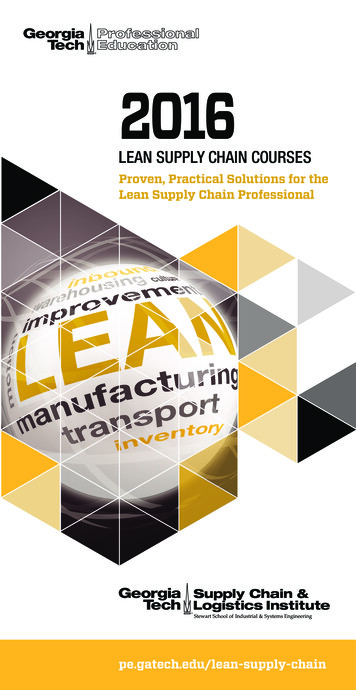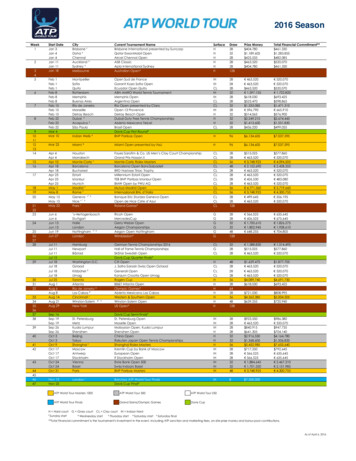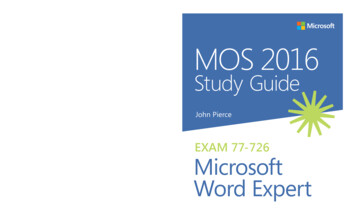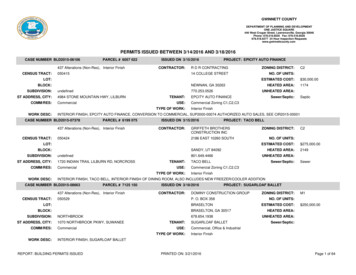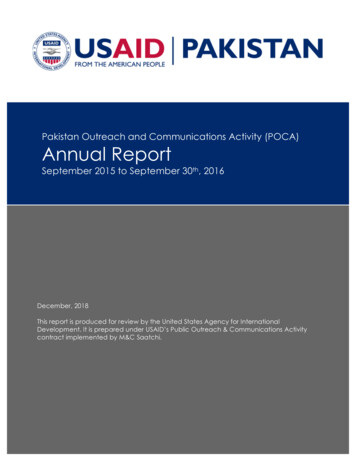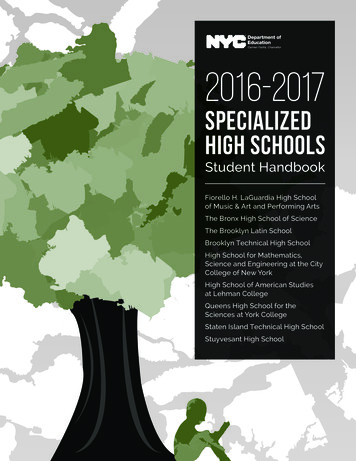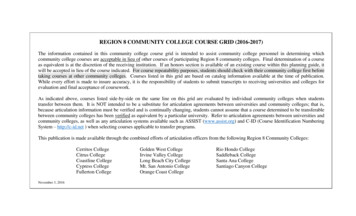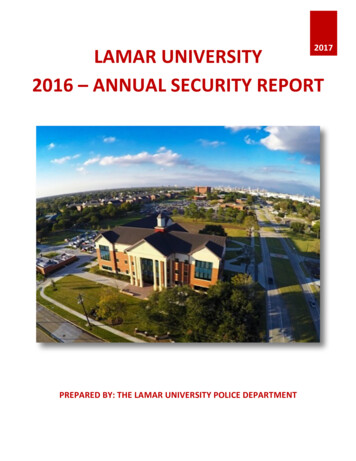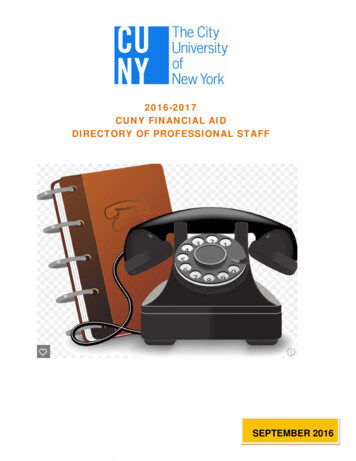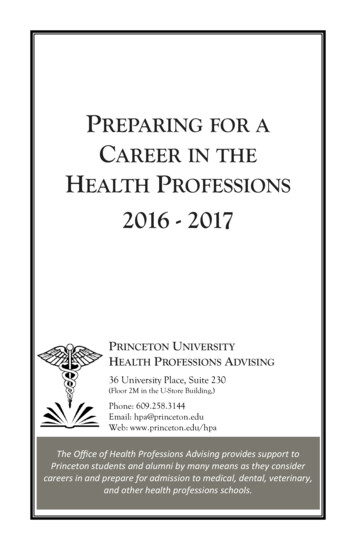
Transcription
PREPARING FOR ACAREER IN THEHEALTH PROFESSIONS2016 - 2017PRINCETON UNIVERSITYHEALTH PROFESSIONS ADVISING36 University Place, Suite 230(Floor 2M in the U-Store Building,)Phone: 609.258.3144Email: hpa@princeton.eduWeb: www.princeton.edu/hpaThe Office of Health Professions Advising provides support toPrinceton students and alumni by many means as they considercareers in and prepare for admission to medical, dental, veterinary,and other health professions schools.
Preparing for a Career in the Health Profess io nsPage 2Preparing for a Career in the Health ProfessionsFirst Year Take some courses that interest you that you may never have heard of in highschool. Think about the things that you want to do/explore/accomplish in college, anddon’t sacrifice them to your interest in “being pre-med.” Strive to do well in your classes – join study groups, go to office hours and fosterrelationships with faculty, go to tutors, the McGraw Center, Writing Center, etc. Improve your time management strategies and study skills.Develop your co-curricular interests; join organizations that you find interesting.Attend pre-professional student group meetings and events.Attend on-campus events that relate to your interests.Meet with a health professions advisor in the Health Professions Advising (HPA)to introduce yourself and discuss your academic and career interests. Start gaining a realistic understanding of the medical world and its diversity. Borrow and read some medically related books from the HPA Library.Surf through the Explore Health Careers website :http://www.explorehealthcareers.org/Read the Health section of The New York Times, or otherwise stay abreastof current events in health care. Draft your resume and bring it to Career Services (across the hall from HPA) forreview. This should include GPA, major, employment, activities, service, medical/research experience, honors, etc. Explore and apply for summer volunteering / research / work opportunities. Keep developing your answers to the following questions: Why do I want to be a health professional?What qualities do I want to embody as a professional?What can I do to develop these qualities in myself?Summer after Freshman Year Participate in research, volunteering, etc. Volunteer with/shadow health professionals in your potential career area. Continue to update your resume to include recent experiences.
Welco mePage 3August 2016Dear pre-health students:Welcome to the Princeton community and to the exciting journeytoward a career in the health professions.The advisers in the Office of Health Professions Advising (HPA) workwith all students and alumni interested in careers in the diverse realmof health professions. While this includes many with pre-medicalaspirations, we are also happy to work with you as you considerbecoming dentists, veterinarians, physician assistants, nursepractitioners, physical therapists, pharmacists, physician scientists,public health professionals, or a professional in another of the diversehealth careers available!This guide has been developed to assist you in planning your path tohealth professions school. As you will hear us reiterate throughoutyour time with us, there is no single, correct way to prepare yourself—there is no magical formula that will ensure your acceptance tomedical school. We are here to help you make informed choices aboutclasses, activities, and your future.In addition to using this guide, we encourage you to attend workshops,familiarize yourself with our website, read our weekly e-newsletter,Vitals, and come to meet with us at any time! We are your advisers forall four years at Princeton and beyond, and the sooner we get to knowyou, the more helpful we can be. Drop-In Hours are available duringthe school year (times are posted on the website and Facebook); youmay make individual appointments through WASS online scheduling.We enjoy working with students at all stages of the pre-health track—indecision and questions are welcome!Kate Fukawa-Connelly, directorAllison Smith, associate directorJennifer Samarel, administrative assistant
Page 4The Divers ity of Health Professio ns CareersTHE DIVERSITY OF CAREERS IN THEHEALTH PROFESSIONSAmong the health professions, medicinehas traditionally drawn the largest number of Princeton graduates. But, there aremany options for students interested inbecoming health care professionals, withvarying degrees of time in school,required knowledge and skills, and careeradvancement opportunities. Within medicine alone there are many careeroptions and a wide variety of ways for you to contribute to society. There arephysicians, veterinarians, and dentists in clinical practice, academic medicine,biomedical research, healthcare administration, public health, college health,government, and many other areas.The HPA website provides information about pre-requisite courses for anumber of health professions, as well as links to gather more information.Sample Careers of Princeton AlumsAllopathic Medicine (MD) Osteopathic Medicine (DO)Veterinary Medicine (DVM, VMD) Dentistry (DMD, DDS)Pharmacy (Pharm D) Optometry (OD) Podiatric Medicine (DP)Physician Assistant (PA) Nursing (NP, RN)Public Health (MPH, PhD) Physician Scientist (MD/PhD)US News Best Healthcare Jobs 20161.2.3.4.5.6.7.8.9.9.OrthodontistDentistNurse AnesthetistPhysician AssistantNurse stObstetrician & gynecologistOral & maxillofacial surgeon
Suitab ility fo r a Health Professio ns CareerPage 5SUITABILITY FOR A CAREER IN THE HEALTH PROFESSIONSYou may not have given it a second thought, since you’ve known “sincebefore you can remember” that you were “destined” to become a doctor.Now is the time to think long and hard about your motivation, consider yourpersonal goals and values, and measure them against concrete informationabout the reality of becoming a health professional.How do you know if you’re well-suited to pursue a career in healthcare? You should have an intellectual interest and ability in science, particularlyconcerning human biology and disease. Different health careers requirediffering amounts of science mastery. You should have a deep and abiding interest in people and theirproblems, and a service-oriented mentality. You should be ready to work in a team setting, both as a leader of theteam, and as a collaborator who draws on others’ expertise. You shouldbe ready to work with a wide variety of people, as your colleagues and asyour patients. You should be comfortable interacting with patients and others in ahealthcare setting. Some medical schools will assign you to your firstpatients in the first week of school. You are going to spend much of yourtraining in the clinical setting—knowing that you enjoy the environmentbefore you apply to health professions school is critical.Gaining actual experience—through courses and activities—will help you toclarify your values, skills, and interests, and to determine whether they’rebest applied to a health professions career.
Page 6Impo rtant Charac teristics in a Health Pro fess ionalPLANNING YOUR PRE-MED/PRE-HEALTH PROGRAMWhat Do Medical and Other HealthProfession Schools Look For?The environment in which healthprofessionals work demands high levels ofintellectual and interpersonal ability. Hereare some characteristics valued by admissioncommittees:Academic ability. Schools want to be surethat students can manage the rigorouscurriculum, which will include a highervolume of scientific information than mostare exposed to as undergraduates.Nora Chen, Dorothy Charles & LawrenceChang. M3 at Penn MedOrientation to learning. Students must have developed strategies that allowthem to process and retain vast quantities of information. Additionally, students who are intellectually curious and adept, are able to solve complexproblems, and are interested in lifelong learning will fare well in the healthprofessions. You have to know how to learn and love learning.Interpersonal skills/Ability to work with others. You should be able to relatewell to a broad spectrum of people with respect, empathy, and compassion;with an open mind and a willingness to help. Step outside your comfort zoneto work with sectors of the population that you may have had limited exposure to or feel uncomfortable with so you will be ready to care for them.Motivation for your future career. It is expensive to educate a healthprofessions student, and deciding who to train is a responsibility that schoolstake seriously – they want to accept students who understand what they aregetting into. You will also be more likely to persist in your preparation if youhave concrete experience with your future career of interest.Personal Competencies. An emerging consensus is arising in medicaleducation: factual knowledge is only part of what makes a skilled physician;personal characteristics, experiences, and attributes are equally significant.Characteristics that are considered particularly important in physicians (andtherefore in medical school applicants) include: Ethical responsibilityReliability & dependabilityService orientationSocial & interpersonal skills TeamworkCapacity for improvementResilience & adaptabilityCultural competenceOral & written communication
Five Facto rs for Program Admiss ionPage 7How Do Admissions Committees Evaluate Applicants?Again, there is no guaranteed way to get into health professions schools, buthere are five main factors that schools will consider in evaluating you:Coursework and grades.Admissions boards will look at the breadth and depth of coursework, andbalance of the academic program. They may want to know why youchose certain courses, or your concentration, or how you made otherdecisions in your academic career. They will look at trends in your GPAand will compute your GPA based for all Biology, Chemistry, Math andPhysics courses, as well as overall. All courses that you have ever takenin college will count toward your applicant GPA (including courses takenoutside of Princeton and courses that you repeat). The average GPA ofaccepted Princeton applicants to medical schools is about 3.55;nationally, it is about 3.7.Activities.Carefully choose your activities and strive for quality of involvementrather than quantity of activities. The only required activity is experiencein a clinical setting that will provide a realistic understanding of caring forothers in a healthcare environment, such as volunteering in a hospital orworking in another patient care facility. Other activities should help youto develop all of those personal competencies listed above. Leadership,community service, and research activities are considered particularlyuseful in preparing for a health professional career.Letters of Recommendation.All schools require them, and most require at least some of them to bewritten by faculty in your science courses. For medical and dental schooladmissions, you’ll be expected to have at least three academic recommendations. Cultivate relationships with faculty and other mentors whowill be able to advocate for you in the admissions process.Standardized Test Scores.Every health professions school requires a standardized test. These testsare designed to evaluate your abilities in areas that will be important inyour further study. Like the SAT and ACT, they also provide a universal“number” against which they can compare all applicants.Interview.All schools require an interview: you’ll be able to expand on your writtenapplication and learn more about the schools to which you’re applying.Cultivate your oral communication skills and gain comfort in speakingwith diverse audiences in preparation for interviews.
Page 8Co-Curric ular Preparatio n fo r Health Profess ions CareersCo-Curricular Preparation for Medical, Vet, & Dental SchoolUltimately, you should get involved with activities that matter to you, on campus, in the larger Princeton community, and during your summers. There areendless opportunities—the arts, athletics, service work, religious organizations, debate, singing groups, etc. Find something you enjoy and devote timeand energy to it. You will be a richer person for it and you will come to youracademic work refreshed. As you participate in your co-curricular endeavors,keep the personal competencies in mind. What are you doing that demonstrates and develops your strengths? Are there areas in which you’d like toimprove through your activities? But remember, you’re a student first! Heavyparticipation in activities at the expense of your academic performance is discouraged. You are welcome to come and talk with an adviser who can helpyou navigate your activities and time management.You may have to work on campus to contribute to your college expenses.Your ability to keep up with coursework and handle a job speaks well aboutyour discipline, motivation, and priorities.Health-Related & “Clinical” Experience:It is essential for you to gain some real-world perspective on whatever formof medicine interests you. There are many ways in which you can learnabout the field, many of which are discussed in detail on our website.Princeton students work or volunteer in hospitals or clinics, do internships(often found through our Vitals newsletter, the International Internship Program, PICS program, or through the Office of Career Services), read about thefield, come to HPA or student organization workshops and programs, shadowfamily doctors, work on clinical trials as research assistants, etc.As you consider types of health care experience, seek to gain a realistic understanding of what being a health care professional is like, to reflect on howyour career of choice might be satisfying to you and to consider ways that youwill best serve your patients and the profession. This should be your first priority if you are considering health professional school. Many students who dosome clinical- or service-related activity during the se
review. This should include GPA, major, employment, activities, service, medical/ research experience, honors, etc. Explore and apply for summer volunteering / research / work opportunities. Keep developing your answers to the following questions: Why do I want to be a health professional? What qualities do I want to embody as a professional? What can I do to develop these qualities in myself .
